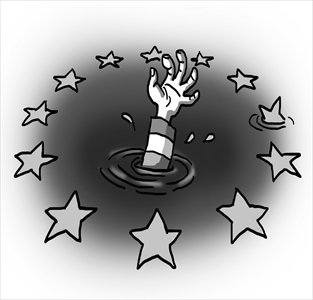Italy's political earthquake major warning for EU

More than once, Italy's trends have prefigured larger European dynamics, for the best, the Renaissance, but also for the worst, Benito Mussolini's fascism, and, by putting a finger on the Italian Peninsula, one often feels the pulse of a continent.
The outcome of the election which determined the composition of the 17th Parliament of the Italian Republic reveals a profoundly fragmented country which, in the middle of a world of changes, questions the EU's orientations.
In the most recent elections in Catalonia but also in the Netherlands, despite nationalistic temptations, the majority considered that the EU has become a necessary instrument to maintain the political relevance of the old continent.
However, anti-European sentiment dominated the vote in Italy, a founding member of the European Community, the country of European patriots like Alcide De Gasperi, Carlo Ciampi or Romano Prodi.
The Europhile Pier Luigi Bersani was unable to reach an undisputable lead, while the incumbent Prime Minister and former EU official Mario Monti underperformed.
By contrast, the eurosceptic forces showed vitality. Not only did Italy give a lifeline to Silvio Berlusconi's demagoguery but it even applauded Beppe Grillo's populist circus.
This is a worrisome moment for Italy and a sad news for the continent: Showmanship was more attractive than soberness, parochial entertainment more than European commitment.
However, Italy and the EU - not a sum of national egos - have the resources to face a crisis which will have far reaching consequences.
With the 3rd economy of the eurozone, the 8th GDP in the world - slightly larger than Russia last year, Italy, a member of the G8 and a cultural superpower, remains a significant player in the world affairs.
Obviously, the next Italian government will face daunting domestic challenges. The country's public debt stands at 126 percent of its GDP, economic output is now 7 percent below its 2007 pre-crisis level, the unemployment rate is high - 37 percent among youth, and a socioeconomic gap between the North and the South divides a country whose centrifugal forces have always been a threat to unity.
However, investors, media and chancelleries should not underestimate Italy's strengths. Many of the medium-sized, family-run Italian companies are genuine poles of excellence with largely positive balance sheets. The brand "Italia" is a universal magnet and, last year, the country realized a $11.5 billion trade surplus.
Italy and Europe shares a common destiny, the continent cannot thrive with a languid "Boot" and vice versa.
It is time to push for a different economic policy at the European level, to put the eurozone on the path of economic growth.
Facing the election of the Bundestag in September, German Chancellor Angela Merkel will not immediately back initiatives, which could ignite substantial economic activities.
But with its $245.8 billion trade surplus, she must be aware that Berlin has the key to Europe's recovery, the condition for enduring German prosperity.
In their quest for growth and jobs, the leaders of Europe have just received strong support from Washington with the announcement by President Barack Obama of a negotiation on a FTA between the world's two largest economies - the EU and the US. Such a FTA would boost GDP on both sides of the Atlantic by up to 2 percent and create 2 million jobs.
While the new Italian leader will have many cards in his hands - domestic, European, transatlantic, he will also have to make wise use of the new international configuration to maximize Italian merchants' traditional ability to trade with every corner of the world.
If, confronted with the profoundly disturbing outcome of the elections, a sensible reaction reenergizes the country and the continent around noble purposes - the solidarity among the people of Europe and the rank of Europe in the 21st century, Italy's tragicomedy can still culminate in a happy ending.
The author is director of the Academia Sinica Europaea at China Europe International Business School, Shanghai, Beijing & Accra, and founder of the Euro-China Forum. opinion@globaltimes.com.cn